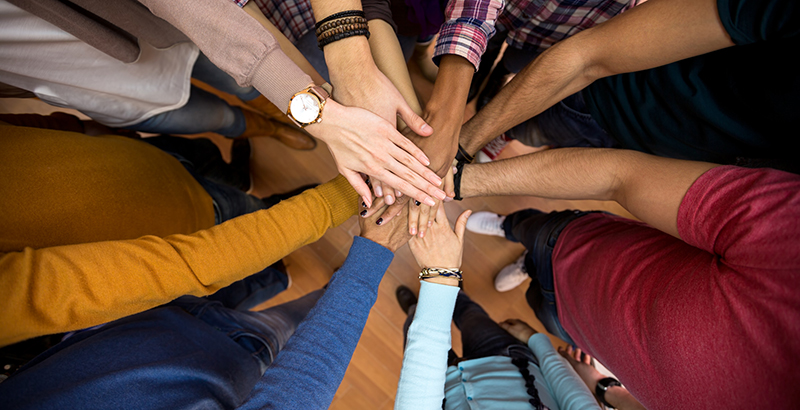Boyd: Newly Formed Seek Common Ground Is a Backbone for Local Advocates Working to Positively Change Public Education

It’s easy to live in a bubble. To interact only with people who think (and look and vote) like you. To watch, read, and listen to media and entertainment that reinforces your point of view. To think of people who don’t believe what you believe as “other.” Much has been made about this division, and what it means to our polity.
With plenty of evidence about what divides us, what binds us together?
Because an equally strong impulse exists, maybe even an evolutionary pull, as Sebastian Junger posits in Tribe, to find connection and belonging. To live a meaningful life. Is this just tribal, or is it bigger? As Americans, there has always been this notion (not necessarily practiced but aspired to) that there are ideals that bind us, across our bubbles and our tribes, to something bigger than ourselves, to community, to service, to ensuring that the next generation has greater prospects.
Five years ago, thinking about how to square these emerging, competing narratives with the fractured and grievance-filled political environment in the area I knew best, education policy and advocacy, I came to this conclusion:
I had been going about it all wrong.
Instead of listening to families and communities about their hopes, dreams, and challenges, I and much of the field had unintentionally promoted division by delivering packaged policy solutions that were not understood and were, therefore, viewed with suspicion.
Families aspire to getting their kids an education that prepares them for healthy, happy, successful lives. That means being prepared for college, a good-paying job, the military (or some combination — and not necessarily in that order). It wasn’t that the field didn’t have a lot of good, research-based ideas; it’s just that those solutions were largely offered up without the knowledge and input from the communities they most hoped to help.
So, five years ago, I had an idea to reimagine education advocacy. The idea was to start a collective impact network of state-based coalitions with local leaders who knew their state well and had a desire to improve the educational prospects of all children by ensuring that students have access to a public education that best prepares them for their future.
What was different about the network — called the Coalition Support Network when it started at Achieve in 2012 — was that while the state-based coalitions all believed in high expectations (and later explicitly added equity), what issues they would choose and the strategies and tactics they would employ to meet those goals would be determined by each coalition and its members. Our role — as the backbone to the network — was to provide whatever support and guidance the coalitions needed to meet the goals they set locally.
The bet — later borne out in an evaluation by the Redstone Strategy Group — was that local advocacy could have an impact across the country, in part because we would see to it that leaders would learn from one another’s experiences.
We believe that local agenda setting (bottom up, not top down) is not only more responsive to state and local sensibilities, it also enables real community engagement and shared ownership of ideas. “Sticky” policies and practices developed by communities have staying power. Issues imposed from afar rarely last; indeed, they often lead to outright hostility.
Our network also, uniquely, believes in the power of relational, not merely transactional (issue-driven) advocacy. Good coalition building takes investment, time, and effort, and leaders who are committed to respectful relationship building. It means listening and throwing out much of what you’ve been taught: instead of ignoring “unpersuadables,” it’s important to seek out those who hold different points of view. It means being less certain of your rightness (and righteousness), and more humble. And practicing empathy. This is how to find common ground.
We also built a network that believes in innovation, evaluation, and continuous improvement. Our innovation pool (now Edison Fund) has enabled coalitions to try more than 30 unique engagement ideas over the years; some didn’t work, but others, such as advancing research-based family engagement and using practices gained through deep canvassing training to engage new community members, have proved wildly successful and replicable. We also believe in constantly evaluating our efforts, as a means to improve practice and to identify what works for the field.
Our novel approach to coalition building — locally led, committed to relationship building and continuous improvement, supported by a backbone that brings experts and research about issues and tactics to the fore — has just launched its next phase: We are now Seek Common Ground.
In five years, our approach to supporting local advocates has become a force for positive change. This approach makes intuitive sense, but it is rarely practiced at any scale for any length of time. Seek Common Ground remains dedicated to the proposition that students deserve a high-quality public education and we can get there by supporting coalitions that listen more, build deep relationships in their communities, and work on solving problems together.
Respectful engagement is the antidote to our divisive environment. And if we can do it on education issues, we can try it elsewhere, too, because rebuilding our connections with one another is how we restore our commitment to the common good. Join us.
Sandra Boyd, the former COO of Achieve, is now CEO of Seek Common Ground, a new organization that incubates and sustains state-based advocacy coalitions committed to ensuring a public education that meets the aspiration of students, families, and communities so that students can become happy, healthy, productive adults. Learn more about Seek Common Ground and its 12 state coalitions here.
Help fund stories like this. Donate now!

;)